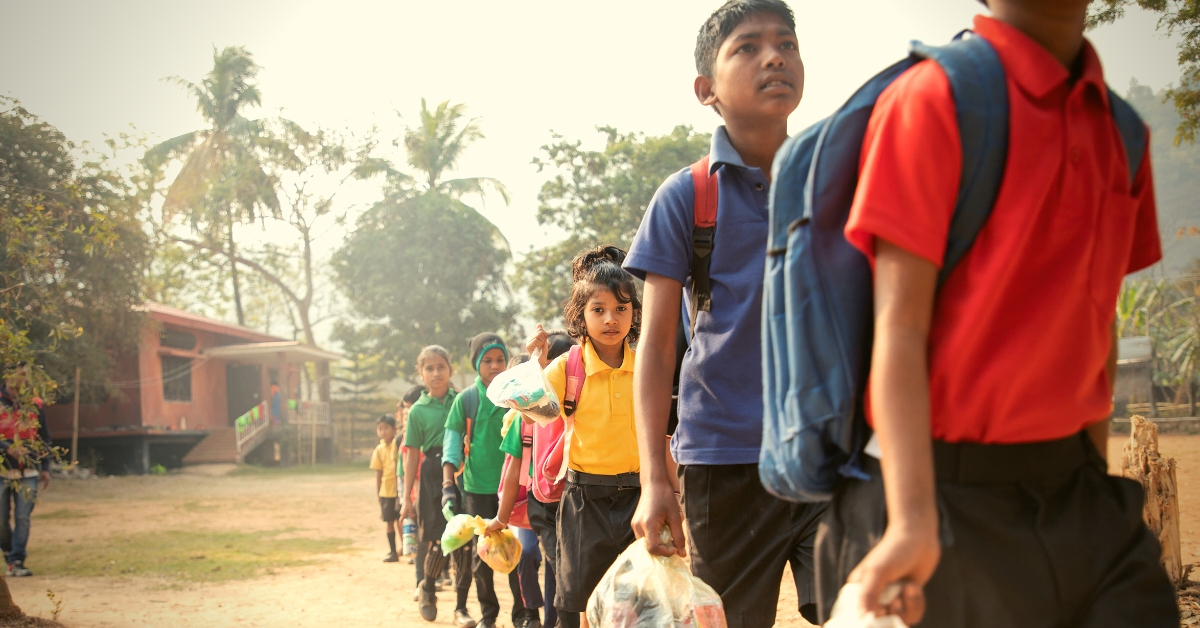I am sure you have traded books, clothes, toys, and other knick-knacks with your sibling or friend, at some point in time.
Formally termed as ‘bartering,’ this exchange of goods and services, has been used as a trading tool since the earliest times. One of the reasons why this system flourished was the advantage of giving up an item that you no longer needed and getting something useful in return.
Incorporating the same logic to address the problem of plastic waste, government and non-government organisations across the world are coming up with innovative barter options.

Indonesia, which is considered to be the world’s second-largest marine polluter, is a practical example here. Citizens can enjoy an hour-long bus ride in exchange for ten plastic cups, five medium and three plastic bottles.
Below are five similar initiatives that India is taking:
1) Plastic Waste As School Fees

When the air pollution from the burning of dry waste, including plastic, reached dangerous levels, Parmita and Mazin Sarma from Pamohi village in Assam decided to accept plastic waste as fees in ‘Akshar’ a school started by them in 2016.
The school has over 100 kids, and each child brings in around 25 items of plastic items, including polythenes, bags, cups, bottles, etc.
The waste deposited by the students is regularly segregated and recycled to improve the infrastructure of the school. For example, the waste bottles are cut into half and used as plant holders.
You can read the full article here.
2) Exchange Plastic Waste With A Meal

The Ambikapur Municipal Corporation in Chhattisgarh has opened a one-of-its-kind café that will give a free meal and breakfast to a ragpicker in exchange for one kilo and 500 grams of plastic waste respectively. The collected plastic will be used to construct roads.
“There are two reasons why we have started this scheme. First, the growing rise of plastic, particularly carry bags, has become a serious issue despite running constant checks on various commercial establishments. So, through this, we are trying to address the plastic problem. Second, there are around 100-odd homeless families for whom we will at least provide meals,” says Manoj Singh, the Municipal Commissioner of Ambikapur.
You can read the full article here.
3) Deposit Plastic Bottles & Get your Phone Recharged
There are 160 plastic bottle crushing machines at 128 railway stations across India, and the Indian railways will soon install 400 more.
However, this time, there will be an added bonus.
The newly installed machines will recharge a passenger’s phone in exchange of a plastic bottle, as per recent reports by the Press Trust of India.
The commuter will have to feed in his or her mobile number and deposit the plastic bottle. The number will act as a key to charge the phone.
4) 500 Grams of Plastic Will Give You Free Food
Started by the alumni of Goethals Memorial School and Nishkam Khalsa Sewa in West Bengal’s Siliguri district, this barter system gives free food to anyone who brings 500 grams of plastic. The exchange system takes place every Saturday.
“There is a tremendous response from the people. This will help in saving our environment as plastic is thrown here and there clog drains and are the cause of floods. Further, it is lethal for animals who consume it,” SP Singh Saluja, President, Goethals Memorial School Alumni told ANI.
5) Give Waste & Sip On Free Chai

With an aim to cut down on the menace of littering that takes place every year during the mega Kumbh Mela in Prayagraj, the mela association and a popular tea brand installed multiple kiosks in several areas this year as per the Times of India.
Each kiosk dispensed a free cup of tea every time recyclable waste items like wrappers, plastic bottles, tetra paks were fed in the kiosk with sensors fitted inside them. It worked like a vending machine except that a person did not have to pay money.
Following this, the Prayagraj Nagar Nigam collected the waste every evening and gave it to recycling companies.
Conclusion
2.1 billion tonnes of plastic waste is generated every year, and this figure is likely to jump to 3.4 billion if a collective action to tackle the waste scientifically is not taken soon. The prediction, made by the World Bank, is alarming considering that a single item of plastic takes up to four hundred years to decompose.
In such a grim scenario, efforts like barter-system can go a long way in cutting down plastic waste.
Featured Image Courtesy: Sr. DME – KGP/Twitter
Also Read: Too Much Plastic at Home? 7 Easy Ways to Run a Sustainable Kitchen in Under Rs 500
(Edited by Gayatri Mishra)
